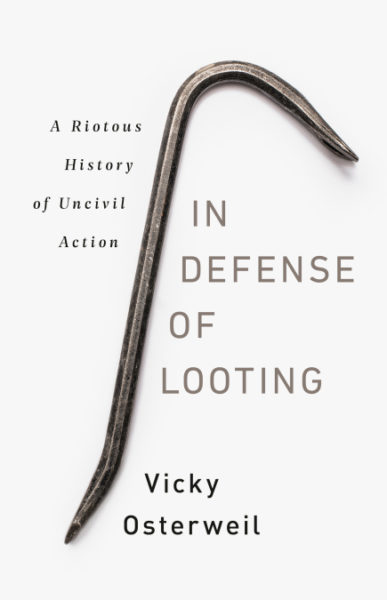Not everyone on the progressive team is all-in on the “Loot your way to utopia”, as Graeme Wood (risking cancellation by his co-religionists) criticizes Vicky Osterweil’s paean to looters and looting:
Last week, NPR’s Code Switch published an interview with Vicky Osterweil, the author of In Defense of Looting: A Riotous History of Uncivil Action. NPR summarizes the book as an argument that “looting is a powerful tool to bring about real, lasting change in society.” If the real, lasting change you wish to effect is burning society to cinders and crippling for a generation its ability to serve its poorest citizens, then I suppose I am forced to agree. Osterweil sees an upside. Looting is good, she says, because it exposes a deep truth about the great American confidence game, which is that “without police and without state oppression, we can have things for free.” She came to this conclusion six years ago, and in her book, which is written “in love and solidarity with looters the world over,” she defends this view as ably as anyone could.
Osterweil’s argument is simple. The “so-called” United States was founded in “cisheteropatriarchal racial capitalist” violence. That violence produced our current system, particularly its property relations, and looting is a remedy for that sickness. “Looting rejects the legitimacy of ownership rights and property, the moral injunction to work for a living, and the ‘justice’ of law and order,” she writes. Ownership of things — not just people — is “innately, structurally white supremacist.”
The rest of the remedy is more violence, which she celebrates as an underrated engine for social justice. The destruction of businesses is an “experience of pleasure, joy, and freedom,” Osterweil writes. It is also a form of “queer birth.” “Riots are violent, extreme, and femme as fuck,” according to Osterweil. “They rip, tear, burn, and destroy to give birth to a new world.” She reserves her most pungent criticism for advocates of nonviolence, a “bankrupt concept” primarily valuable for enlisting “northern liberals.” Liberal is pejorative in this book. Martin Luther King Jr. is grudgingly acknowledged as a positive figure, but not as positive a figure as he would have been if he had kicked some white-capitalist ass and put a few pigs in the ICU. The “I Have a Dream” speech was, Osterweil writes, “the product of a series of sellouts and silencings, of nonviolent leaders dampening the militancy of the grass roots” and “sapping the movement’s energy.” More to her taste is Robert F. Williams, who practiced armed resistance, and Assata Shakur, who murdered a New Jersey police officer and remains a fugitive in Cuba. The violence needn’t be in self-defense — Shakur’s certainly was not. Osterweil quotes the “wisdom” of Stokely Carmichael: “Responsibility for the use of violence by black men, whether in self-defense or initiated by them [emphasis mine], lies with the white community.”
By now you have guessed that I am not the audience for this book. I have a job, and am therefore invested in building a system where you get paid for your work and pay others for theirs, and then everyone pays taxes to make sure that if these arrangements don’t work out, you can still have a dignified life. (Easily my favorite line in the book was written not by the author but by her publisher, right under the copyright notice: “The scanning, uploading, and distribution of this book without permission is a theft of the author’s intellectual property,” it says. “Thank you for your support of the author’s rights.”) My job sometimes entails traveling to countries recently or currently destroyed by civil unrest, and that experience has made me appreciate the fragility of peace, and has not made me eager to conduct a similar experiment in my own city.




